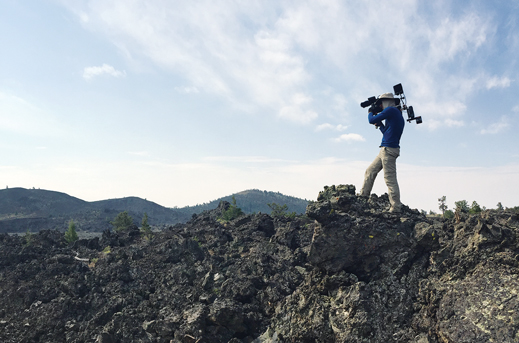George Zaidan ’08 has spent the last seven years pursuing an unconventional career path for someone with his background. Since earning a bachelor’s in chemistry, Zaidan has been in television and Web broadcasting, in roles from on-air host and vocal talent to producer, writer, and director. He’s developed a reputation for offering a behind-the-scenes perspective with a scientific slant, and his most recent venture has him blending science, business, and engineering in a new CNBC TV series.

The first season of Make Me a Millionaire Inventor, which premiered in August, was a six-episode series on a mission to find and bring to life the best inventions never made.
“This show aligns perfectly with what I want to do—be a part of quality television that explores the process of how things happen,” says Zaidan. “The show also really encourages people to tinker, invent, and follow their dreams.”
When he’s not hosting the show, Zaidan continues to run his science/engineering media production company Free Energy Productions, which focuses on nontraditional educational media. “Our mission is to produce content about science and engineering at the intersection of artistic excellence and commercial viability,” he says.
Zaidan partnered with MIT’s Strategic Education Initiatives group on two Web series, Science Out Loud and a show about MIT and NASA geologists set in Idaho’s ancient lava flows. His new National Geographic Web series about ingredients in everyday products premieres in January. He has also developed, written, and hosted shows for the Weather Channel and the Pentagon Channel and has written and voiced several TED-Ed videos.
If you have an invention you’d like to be considered for season two of Make Me a Millionaire Inventor, write to inventorcasting2016@gmail.com
Keep Reading
Most Popular
Large language models can do jaw-dropping things. But nobody knows exactly why.
And that's a problem. Figuring it out is one of the biggest scientific puzzles of our time and a crucial step towards controlling more powerful future models.
The problem with plug-in hybrids? Their drivers.
Plug-in hybrids are often sold as a transition to EVs, but new data from Europe shows we’re still underestimating the emissions they produce.
Google DeepMind’s new generative model makes Super Mario–like games from scratch
Genie learns how to control games by watching hours and hours of video. It could help train next-gen robots too.
How scientists traced a mysterious covid case back to six toilets
When wastewater surveillance turns into a hunt for a single infected individual, the ethics get tricky.
Stay connected
Get the latest updates from
MIT Technology Review
Discover special offers, top stories, upcoming events, and more.